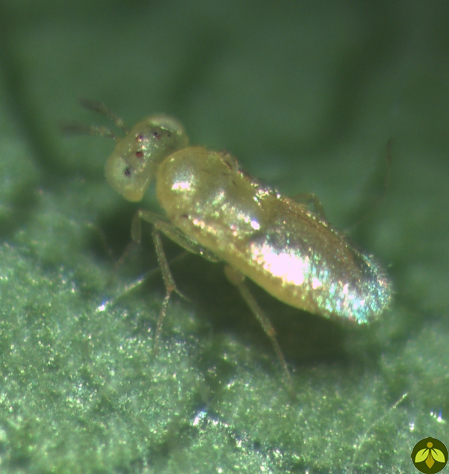Description

Aphytis melinus, also known as “The Golden Chalcid,” is used to prevent and manage low-infestations of various armored scales. These yellow-gold, 1.2 mm. mini-wasps are best used to tackle and maintain minor to heavy infestations of several armored scale species. And, if established, they can adequately protect a planting for a season or, perhaps, more in certain situations.
A. melinus, which are shipped as pre-emerged adults, are the product of choice when armored scales that can host the Golden Chalcid (KAL-cid) are present. Armored scale insects do not produce honeydew and, therefore, the mini-wasps are not accustomed to it, even though these parasitoids are typically shipped with honey or a honeydew substitute, but this just satisfies their need for moisture.
Some of the species which can be controlled with these parasitoids include the California red (their favorite) and yellow scale insects (Aonidiella aurantii and A. citrina, respectively); the San Jose scale (Quadraspidiotus perniciosus); the ivy or oleander scale (Aspidiotus nerii); the oystershell scale (Lepidosaphes ulmi) and other economically important species.
Life-style
The life-span of these parasitoids is 18 days in their immature stages, then not quite a month as adults. The conditions for optimum performance will be between 76-85°F with relative humidity between 40-50%. But these are optimum conditions, and not necessarily a prerequisite of successful implementation. Please note, however, significantly cooler or warmer temperatures and humidity fluctuations may hamper reproduction and development a certain degree.
Benefits
A. melinus are superb curative agents, thus offering growers a potential money-saving tool (they’re a lot more economical than pesticides). Additionally, they can establish themselves in nearly any situation. Once established, growers might be able to reduce the size of, or curtail, future releases due to the presence of on-site wasps; another potential money-saver.
Lastly, these parasitoids, being shipped as adults, offer the benefit of fast oviposition or egg-laying, plus a lot of host-feeding.
Drawbacks
Scouting
Advisories
Usages
Release Rates for Aphytis melinus
| Classification | Release Information |
|---|---|
| Preventative | 1-3/square feet, monthly, as needed |
| Low to medium infestations | 3-6/square feet, bi-weekly, as needed |
